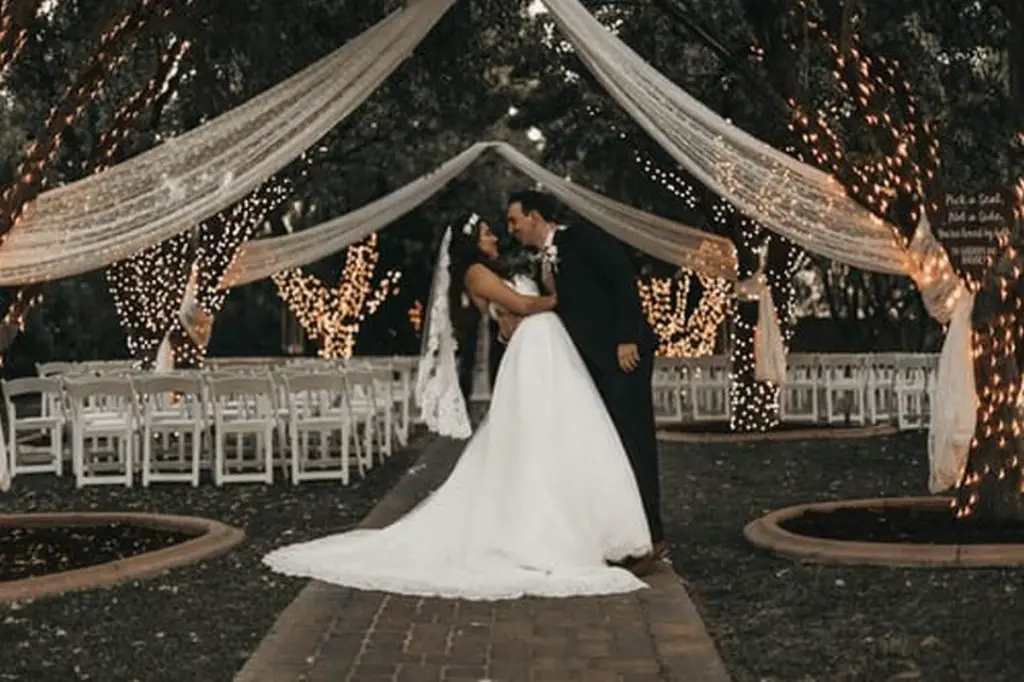Planning wedding accommodation is essential for a seamless and enjoyable experience for the newlyweds and their guests. The right arrangements ensure comfort, minimise travel time, and provide logistical convenience, contributing to a stress-free celebration.
This guide covers key aspects like estimating room needs, choosing between different room block options, and selecting a hotel based on proximity and amenities.
We also explore details such as the bridal and groom’s suites, managing room blocks, and catering to special needs to create a memorable, well-organised wedding experience.
Let’s get straight to the point
Wedding accommodation planning is key to a smooth, enjoyable experience for the newlyweds and guests.
It involves estimating room needs, selecting the right room block options, and choosing hotels based on proximity and amenities.
Important considerations include the bridal and groom’s suites, privacy arrangements, and coordinating logistics between the hotel and the wedding venue.
Offering local information, planning pre- and post-wedding events, and accommodating special needs enhance the overall experience, ensuring a memorable, stress-free celebration.
Why Wedding Accommodation Matters

- Ensures the newlyweds and guests have a comfortable and convenient resting place after the celebrations.
- Provides a seamless transition between the venue and accommodation, minimising travel time and stress.
- Enhances the overall experience for guests, contributing to the enjoyment and success of the wedding weekend.
- Offers logistical convenience, making it easier for everyone to attend wedding events on time and comfortably.
- Allows for group discounts and room blocks, providing cost-effective options for guests.
Guide To Planning A Perfect Wedding Accommodation
1. Estimating The Number Of Rooms Required
One of the first steps in booking accommodation for your wedding is estimating how many rooms you’ll need. Here’s how to approach it:
- Count Out-of-Town Guests: Review your guest list and identify those travelling to attend the wedding. These are the people who will most likely require accommodation.
- Consider Room Blocks: If you anticipate needing ten or more rooms, reserving a room block is a practical and cost-effective option. A room block allows you to reserve several rooms at a discounted rate, ensuring your guests can stay close to each other and the wedding venue.
2. Understanding Room Block Types
Understanding the different types of room blocks available is important, as this will influence your planning and budgeting. Here are the two main types:
- Closed Block: This option guarantees a set number of rooms, but you are financially responsible for them, whether or not they are all filled. This is best if you’re confident in the number of guests needing accommodation. It is also advisable when your wedding coincides with a major local event, as it ensures availability.
- Open Block: A more flexible option, this type of room block allows guests to reserve rooms without you taking financial responsibility. The rooms are held for your guests until a specific date, after which they are released to the public. This is ideal for weddings with a mix of local and out-of-town guests.
3. Choosing The Right Hotel Location
The location of your chosen hotel plays a major role in guest convenience and the smooth flow of events. Here’s how to select the best location:
- Proximity to the Venue: The closer the hotel is to your wedding venue, the better. It minimises travel time for guests and makes it easier for them to attend all wedding events on time.
- On-Site Accommodation: If your wedding venue offers on-site accommodation, it’s often the most convenient option. Check with the venue manager about availability and any special rates they might offer for wedding parties. It simplifies logistics and offers guests an all-in-one experience.
- Nearby Hotels: If on-site accommodation isn’t available or is too expensive, choose hotels within a short drive of the venue. Ideally, book a block at one or two hotels to give your guests options while keeping everyone relatively close.
4. Prioritising Hotel Amenities
The right hotel amenities can significantly enhance your guests’ experience. When choosing, keep these features in mind:
- Dining Options: Hotels with restaurants or bars provide convenient gathering spots for guests outside the main wedding events. This is particularly useful for post-wedding brunches or informal gatherings.
- Shuttle Services: Some hotels provide shuttle services to and from the wedding venue. This can be a valuable service, especially for guests needing transport.
- Recreational Facilities: Pools, gyms, and family-friendly areas can be drawn, depending on your guests’ demographics. A hotel with a playground or kid-friendly pool can be a bonus for families.
5. The Importance Of The Bridal Suite
The bridal suite is a key feature to consider when planning wedding accommodations. It’s a place for the bride to relax and serves as a preparation space on the wedding day. Here’s what you should look for:
- Spaciousness: Ensure the suite is large enough to comfortably accommodate the bride and her bridal party. It should also have ample room for makeup artists, hair stylists, and photographers without feeling cramped.
- Private Bathroom: A dedicated bathroom is crucial for convenience and privacy, especially during the busy hours of preparation.
- Dressing Table: A dressing table with good lighting is essential for makeup application. It ensures everything is well-organised and the bride can prepare in comfort.
6. Groom’s Suite: What To Look For
The groom and his party also need a comfortable and practical space to prepare. Consider these features when booking a suite for them:
- Entertainment Options: A TV, gaming console, or poker table can help the groom and his party relax before the ceremony. It provides a casual environment where they can unwind.
- Privacy: The suite should offer a private space for the groom to get ready without interruptions, similar to the bridal suite.
7. Booking And Managing Room Blocks
When booking room blocks, it’s important to negotiate terms and understand your options to ensure you get the best deal:
- Attrition Clauses: Some hotels include an attrition clause, which requires you to pay for a percentage of rooms if they remain unbooked. Understand this clause and negotiate it down if possible to minimise potential costs.
- Allowable Shrinkage: This refers to the percentage of rooms you can release without penalty, usually between 10% and 20%. Start with a smaller block and increase the number as necessary to avoid paying for unused rooms.
8. Privacy Considerations And Room Assignments
Sharing the same hotel with your guests has its benefits, but privacy should also be a consideration:
- Request Separate Floors or Sections: To maintain some privacy, request that you and your wedding party be placed in a quieter hotel section, separate from the rest of the guests.
- Keep Room Numbers Confidential: Avoid sharing your room number broadly to prevent unexpected visits from well-meaning guests or family members at inconvenient times.
9. Coordination Between The Hotel And Venue

Effective coordination between the hotel and your wedding venue is essential for a smooth experience:
- Transport Arrangements: If the hotel doesn’t provide shuttle services, consider organising a transportation option for your guests. This could be a shuttle bus or rideshare coordination, ensuring guests know the pickup and drop-off points.
- Early Check-in Options: Guests arriving for an afternoon ceremony may need to check in early to freshen up. The hotel can accommodate this need by offering flexible check-in times.
10. Providing Local Information For Guests
Helping your guests feel at home is a great way to enhance their experience. Consider preparing a guide with local recommendations:
- Local Restaurants and Cafes: Highlight your favourite coffee, brunch, or dinner spots. Explaining why you love these places can add a personal touch and make guests feel more connected.
- Activities and Attractions: Suggest local events, museums, parks, or beaches. Information about local festivals happening during the wedding weekend can also be helpful for guests looking for things to do.
11. Extending The Celebration: Pre- And Post-Wedding Events
Keep the festive spirit alive by organising additional events before and after the wedding. Some ideas include:
- Pre-Wedding Gatherings: Consider hosting an informal gathering, such as a beach picnic, hike, or visit to a local winery or brewery. These activities allow guests to socialise and feel part of the celebration.
- Post-Wedding Brunch: A relaxed brunch the day after the wedding is a great way to thank your guests and spend time with them before they leave. It also allows for final farewells in a more informal setting.
12. Planning Ahead: Booking Tips And Timelines
To ensure availability and the best rates, plan your accommodation booking well in advance:
- Start 3-8 Months Before: Begin the booking process 3-8 months before the wedding date. This allows time to compare options, negotiate rates, and secure the best deals.
- Save-the-Date Notifications: Once you’ve confirmed room blocks, share the information with your guests as soon as possible. Include the hotel’s contact details, booking code, and hotel reservation deadlines.
- Negotiate Flexible Terms: Early communication with hotels can also help you negotiate flexible check-in and check-out times, especially for guests attending a daytime ceremony.
13. Budget Management And Guest Accommodation Options
Managing accommodation costs can be challenging, but offering options for guests can help:
- Negotiate Group Discounts: Hotels often provide discounted rates for room blocks, but don’t hesitate to negotiate further if you book multiple rooms or nights.
- Offer Different Price Points: Not all guests have the same budget. Provide a list of hotels at varying prices so guests can choose based on their budget. This can be done by booking mid-range and more affordable blocks.
14. Catering For Special Needs
Consider the unique needs of your guests when choosing hotels:
- Family-Friendly Options: If many families attend, look for hotels that provide child-friendly amenities like play areas or kids’ pools.
- Accessibility: Ensure the hotel offers facilities for guests with disabilities or mobility issues. This includes checking for wheelchair-accessible rooms and common areas.
Conclusion
Planning wedding accommodation is essential for a seamless and enjoyable experience for newlyweds and guests.
You ensure comfort and convenience by accurately estimating room needs, choosing the right room block options, and selecting a convenient hotel based on proximity and amenities.
Focus on details like the bridal and groom’s suites, managing room blocks, and catering to special needs for a smooth celebration.
Coordinating logistics between the hotel and venue, offering local information, and planning pre- and post-wedding events enhance the overall experience, making the wedding memorable and stress-free.

